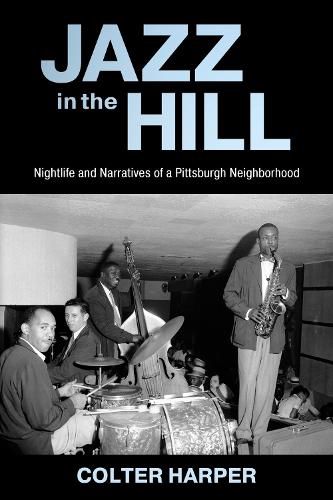Readings Newsletter
Become a Readings Member to make your shopping experience even easier.
Sign in or sign up for free!
You’re not far away from qualifying for FREE standard shipping within Australia
You’ve qualified for FREE standard shipping within Australia
The cart is loading…






This title is printed to order. This book may have been self-published. If so, we cannot guarantee the quality of the content. In the main most books will have gone through the editing process however some may not. We therefore suggest that you be aware of this before ordering this book. If in doubt check either the author or publisher’s details as we are unable to accept any returns unless they are faulty. Please contact us if you have any questions.
From the 1920s through the 1960s, Pittsburgh's Hill District was the heart of the city's Black cultural life and home to a vibrant jazz scene. In Jazz in the Hill: Nightlife and Narratives of a Pittsburgh Neighborhood, Colter Harper looks at how jazz shaped the neighborhood and created a way of life. Beyond backdrops for remarkable careers, jazz clubs sparked the development of a self-determined African American community. In delving into the history of entrepreneurialism, placemaking, labor organizing, and critical listening in the Hill District, Harper forges connections to larger political contexts, processes of urban development, and civil rights struggles.
Harper adopts a broad approach in thinking about jazz clubs, foregrounding the network of patrons, business owners, and musicians who were actively invested in community building. Jazz in the Hill provides a valuable case study detailing the intersections of music, political and cultural history, public policy, labor, and law. The book addresses distinctive eras and issues of twentieth century American urban history, including notions of "vice" during the Prohibition Era (1920-1934); "blight" during the mid-twentieth century boom in urban redevelopment (1946-1973); and workplace integration during the civil rights era (1954-1968). Throughout, Harper demonstrates how the clubs, as a nexus of music, politics, economy, labor, and social relations, supported the livelihood of residents and artists while developing cultures of listening and learning. Though the neighborhood has undergone an extensive socioeconomic transformation that has muted its nightlife, this musical legacy continues to guide current development visions for the Hill on the cusp of its remaking.
$9.00 standard shipping within Australia
FREE standard shipping within Australia for orders over $100.00
Express & International shipping calculated at checkout
This title is printed to order. This book may have been self-published. If so, we cannot guarantee the quality of the content. In the main most books will have gone through the editing process however some may not. We therefore suggest that you be aware of this before ordering this book. If in doubt check either the author or publisher’s details as we are unable to accept any returns unless they are faulty. Please contact us if you have any questions.
From the 1920s through the 1960s, Pittsburgh's Hill District was the heart of the city's Black cultural life and home to a vibrant jazz scene. In Jazz in the Hill: Nightlife and Narratives of a Pittsburgh Neighborhood, Colter Harper looks at how jazz shaped the neighborhood and created a way of life. Beyond backdrops for remarkable careers, jazz clubs sparked the development of a self-determined African American community. In delving into the history of entrepreneurialism, placemaking, labor organizing, and critical listening in the Hill District, Harper forges connections to larger political contexts, processes of urban development, and civil rights struggles.
Harper adopts a broad approach in thinking about jazz clubs, foregrounding the network of patrons, business owners, and musicians who were actively invested in community building. Jazz in the Hill provides a valuable case study detailing the intersections of music, political and cultural history, public policy, labor, and law. The book addresses distinctive eras and issues of twentieth century American urban history, including notions of "vice" during the Prohibition Era (1920-1934); "blight" during the mid-twentieth century boom in urban redevelopment (1946-1973); and workplace integration during the civil rights era (1954-1968). Throughout, Harper demonstrates how the clubs, as a nexus of music, politics, economy, labor, and social relations, supported the livelihood of residents and artists while developing cultures of listening and learning. Though the neighborhood has undergone an extensive socioeconomic transformation that has muted its nightlife, this musical legacy continues to guide current development visions for the Hill on the cusp of its remaking.